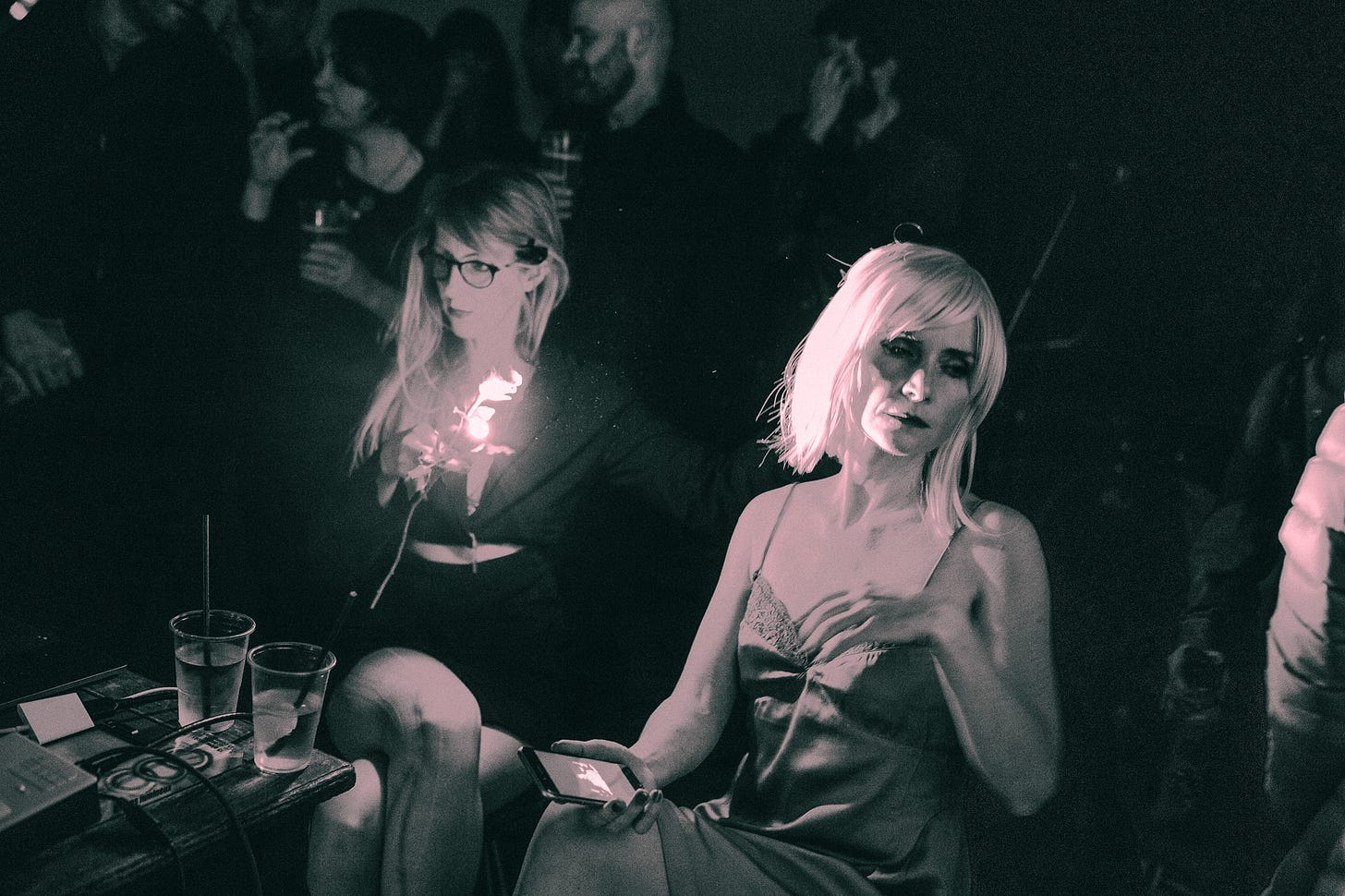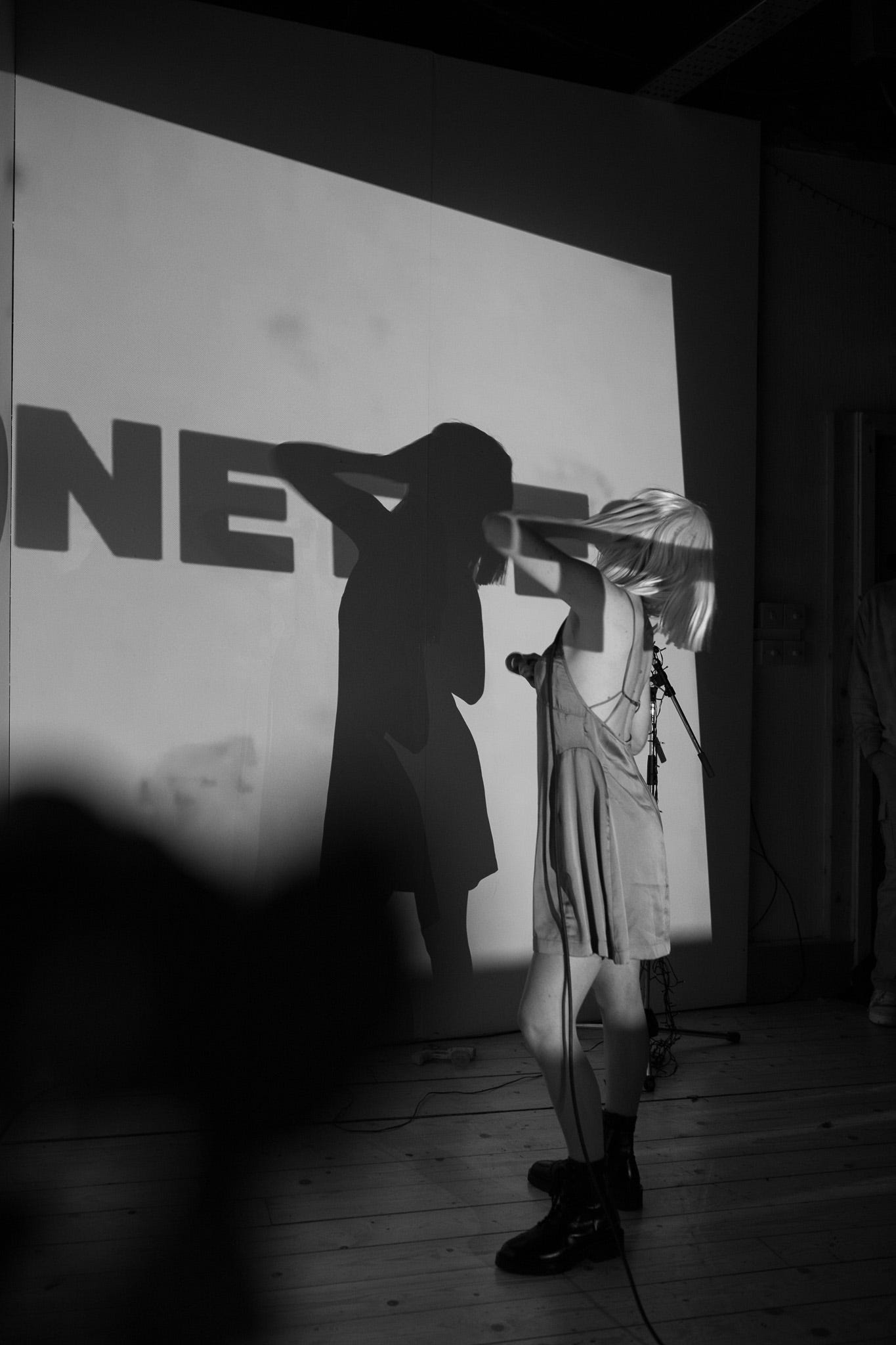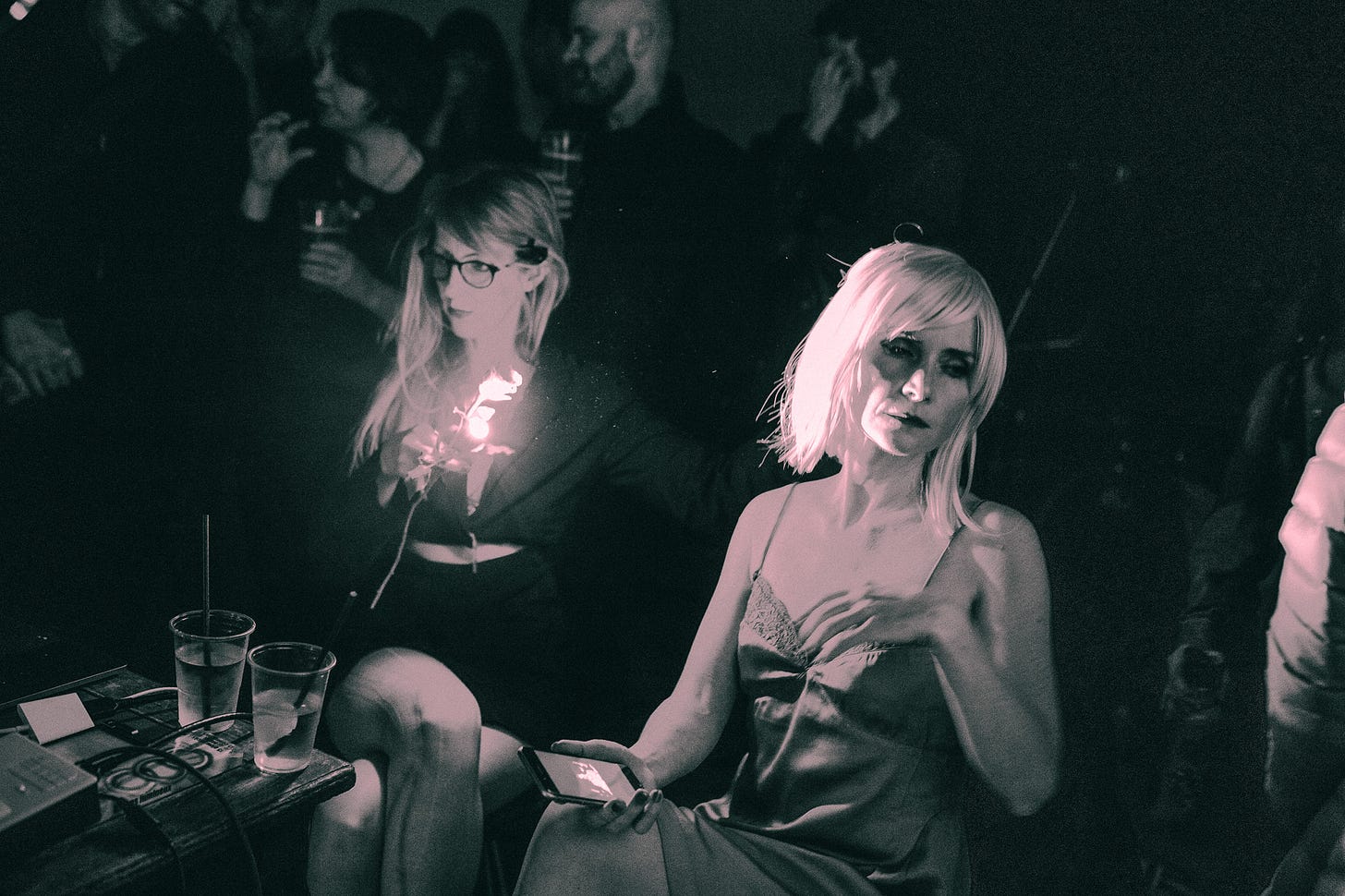“I tend to think that records are built out of an unconscious yearning for something” (Cave, cited in Cave and O'Hagan, 2023, p.35).
On surfing the net without chasing the elusive ‘x’
Remember when you could actually surf the net without having to chase an elusive ‘x’ around the screen or click ‘accept’, ‘block’, or ‘deny’? Booking.com sends me yet another reminder to review my latest hotel stay. HMV wants me to review the CD I bought last month. Academia.edu continue their Holy Grail to ascertain whether or not I am, in fact, The Samantha L Talbot that wrote a paper on water management in Darwin. Due to their persistence, though, I am, in fact, starting to believe that I am the Samantha L Talbot who wrote some polemic on water management in Darwin that transformed the lives of sewage disposal workers throughout the Northern Territory, enabling them to sit back in the knowledge that the bots have it all under control and they can put their feet up.
Likewise, here in Stackville, DM’s are beginning to slide in, like some brand new thing, concurrent with visible subscriber counts, graphs, metrics, followers, recommendations, restacking, notes, and private messaging. Monetisation and ads will surely follow. My inbox is inundated with publications or previews prompting me to upgrade for the full experience, whatever that might be. On clicking ‘unsubscribe’, though, it rarely ends there. An automated email no sooner pings in with: You’re off the list. We’re sorry to see you go. It rarely ends there, either, for I am then prompted: Was this a mistake?
One of the beauties of analogue, of course, is that delete means delete. There is no going back. Whereas now we can all ghost, disappear, reappear, or reinvent ourselves whenever we feel like it because feeling, mashed up with emotion and affect, is our economy.
The Korean-German philosopher, Byung-Chul Han critiques ‘emotional capitalism’ as an umbrella term by distinguishing between feeling and emotion in chapter nine, “Emotional Capitalism” in his essay on neoliberal psychopolitics and Big Data, Psychopolitics. Neoliberalism and New Technologies of Power (2017).1
His position differs from the Israeli sociologist Eva Illouz’s Cold Intimacies: The Making of Emotional Capitalism (2007)2, after which this post is entitled. Han rather points out that emotion and affect are not indistinguishable, with feelings being transient, and durational (Han, 2017, p.43).
Illouz, who has written extensively on love and the current state of the dating ‘market’ and the commodification of love and romance, however, emphasises that emotional capitalism demands a level of self-disclosure/exposure from an individual/employee, in order for them to seem real to others. People have come to expect this as social media continues to commodify and profit from the display of emotion and trauma narratives espoused online. Such a trajectory prefigures that explored by Catherine Liu (2021) in Virtue hoarders: The case against the professional managerial class.3
Of much reference to our impulse to share online, Han argues in his precursor, The Burnout Society (2010)4, that, in Hegelian terms, we have internalised the master/slave dialectic, curating our lives for free for all to see, when the reality might well be that less than 5% of your followers will even see your posts. In his ongoing critique of Big Data he argues that freedom is now tantamount to self-exploitation. The antidote looks likely to be the nurturing of IRL communities, discords, private messaging groups, and collectives, regional or local touring, or playing to a small room of friends and not necessarily putting it all online.
On the ecstasy of digital intimacies
One of the overriding themes of Space Junk was the illusory ecstasy of digital intimacies. What I mean by that is the spontaneity online communications afford, and the instant connections which can entail.
Track four, "Stars (Disappearing Messages)"5 on Space Junk is an ambient track which explores the dialectic between intimacy and distance navigated through our phones at the touch of a screen. Under “clickbait capitalism” (2024)6 we flick our desires into being, feeding our predilection for distraction over ennui (Pmilat, 2014; Fisher, 2022)7
On reviewing Kim Gordan’s new album, D’Souza (2024) interviewing the artist for Pitchfork, concludes, “Kim Gordon, like everyone, is addicted to her phone.”8
Gordon’s second release, The Collective9 is pitched at an 8.5. D’Souza (2024) plucks out Gordon’s “deadpan, stream-of-consciousness lyrics” in which she “recites packing lists or mutters about driving in Los Angeles” … “revel[ling] in the broken and the mundane.”
Interestingly, in terms of Gordan’s multidisciplinary and self-made oeuvre, the title of the album is shared with a painting she recently exhibited at New York’s 303 Gallery. The painting is composed of 27 iPhone sized holes punched out of the canvas—a sort of commentary on the ‘infinite scroll’. (I will return to ‘holes’ later.)
I like Gordon, not only for maintaining that ever-so slightly, unruly bob, coupled with her no-nonsense expression on being photographed face-on. I respect any woman over 35 being photographed face on when, as I have been told, photographers will routinely prompt them to turn in profile, or look down for the cover art.
At the age of seventy and having played in bands for 38 years before making her debut, I also appreciate her admission that she kind of fell into music, citing that she never really felt she fitted in. Gordon’s guitaring is idiosyncratic, self-accomplished and unashamedly so.
In her chapter “Music on the internet has no context” (Gordan, 2020, p.7010), in Gordan and Gleeson’s edited book This woman’s work. Essays on music (2022), the singer-songwriter and musician taps into the immediate, stating that: “Everything I do is out of impulse, so I don’t know if that’s punk or rock. I’ve always just followed my impulses, and created sounds that emanate from being myself”.
Moreover, D’Souza suggests that The Collective “…sounds how TikTok brain feels”, “impulsive and lizard brained”, which I can’t say I like so much. So, we like things, or we don’t and we often don’t know why.
On the Wild West
This happened to me the other day on coming across an article featuring the work of the British photographer, Jane Hilton. Hilton’s work is utterly seductive. She has, for the last 25 years, driven around the Western states of the US documenting her subjects with a kind of revelatory affection. These range from prostitutes, lovers, drag queen cowboys, lion tamers, shooters on the range and other exotic misfits who aren’t illegal, as such, but who occupy strange, liminal zones, fringed with social exclusion. As an artist, hers is not a moral quandary but more a form of decent exposure. In her photographs, elements of masquerade, make-up, and glittering gowns brush up against the intimacy of motel nudes.
Hilton began photographing punks and goths on the streets of Northern England, namely, Lancaster which is a far cry from Las Vegas. On visiting the American West, she was captured by the light, heralding a lifelong obsession with all things Americana.
With her book of portraits, “Precious” (2013)11, for example, she mutes any prospect of voyeurism by becoming a confidante. Her immersive methods included getting to know her subjects by stepping into their liminal worlds. For example, she resided in the brothels herself for the duration of the shoot, putting her subjects at ease, and gaining their trust.
These nudes were shot with her plate camera. The plate camera would return in later work - Drag Queen Cowboys (2020) - an evocative apogee, shortlisted for the Sony World Photography Awards in 2021 which I flesh out below, as it is the piece which drew me in. I find her works to be revelatory.
Precious was kindled by Hilton’s earlier visits in 2000 to Madam Kitty‘s Cathouse in the state of Nevada (the only state in the U.S.A in which prostitution is legal) with the BBC having commissioned her at the time to make ten documentary films. In 2012, though, Hilton felt compelled to return.
What drives such returns, though?
Saloon
When the Glasgow-based filmmaker, Simone Smith, and I created Saloon (2023, we conceived of it as an homage to Americana and John Wayne Westerns. It was also an immersive audio-visual installation and light show, including strobe lighting in the climax.
Similarly, Hilton muses upon the quality of the light which has repeatedly drawn her back to the West.12 With Drag Queen Cowboys (2020), she cites Arthur Miller’s The Misfits (1961) (dir. by John Houston) as a primary inspiration. Hilton’s method was to cajole her subjects from their neon habitats, where they would almost certainly have been photographed in colour, and transpose them to the outskirts of Vegas.
Performers and exhibitionists by trade, they had all made their own Western outfits, and applied their own make-up, wigs and accessories. Hilton describes her urge to shoot on a 5x4 camera, in black-and-white, without digital technology or retouching in more spiritual terms. *Please refer to Hilton’s website for photographs of Drag Queen Cowboys which I have not been able to reproduce here due to copyright.
As I stared at the images, incongruent, as if her subjects had been put down there, in the desert, under silver light, posing amidst those all too familiar backdrops, those we know from film, in which reality is entwined with fantasy, and vice versa, my eye was drawn to the long shadow cast by what must have been an early morning or late afternoon shoot, the sound of flies and to what lies outside the frame, unseen, unimagined. Beauty depends upon holding something back, not revealing all (Han, 2018).13
But what of beauty when AI influencer girlfriends are fast on their way to replace the in real life versions? 25 year old Aitana Lopez is the first Spanish AI model (see Instagram @fit_aitana) who is an internet sensation. Aitana has pink hair, perfect breasts yet not a spare inch of flesh, a nonchalant pout and an impossible hip to waist ratio. Users can even try out building their own Aitana. Is she beautiful, though? Impossibly so, but will this type of pneumatic AI beauty get boring? Probably.
In Lacanian psychoanalysis, desire is tied to scarcity, or lack. In terms of the commodification of the dating market, our desires play out through the illusion of choice which is symptomatic of “clickbait capitalism”14 (2023). Dating sites now, for example, limit the number of ‘likes’ free users can send in any one day without upgrading their subscription. Users are dispensable, in general, and pitched against one another. They are ‘ghosted’ at a whim, or commonly matched with, and subjected to the ‘slow fade’. The prompts don’t work because they’re not designed to. The whole point of dating apps is to keep you on the app.
This brings me onto the commodification of love. The French philosopher, Alain Badiou, argues, in his impassioned treatise In Praise of Love (Badiou and Truong, 2012)15, that such commodification has changed the very structure of desire. The use of the word is not incidental. We talk about falling in love which algorithms prevent from happening. Badiou’s point is that we need the fall as love, at its most real, is “zero-risk”.
After Badiou, Žižek tends to reiterate that algorithms, matches, best bees, highlights, virtual roses, and carousel of inane prompts are eliminating risk from the process and thus returning us to the pre-Romantic era of “no contingent ‘fall’ proper” (2014, p.73)16. Whereas, love is the ultimate Event17, causing us to retroactively determine our trajectory, even fate, to have been leading up to the meeting of this person. In reality, our past has not changed but how we frame it has. Love happens to us. By the time we are in love, though, it is too late to discern why we fell in love. Moreover, we may be unable to pinpoint what it is we love about this person. We just love.
Through my spontaneous song-making, I found such theory wove its way into the lyrics of the one-take, approximately twelve-minute, track “Freezer Delight,”18 on Space Junk. Theory can slip in by osmosis.
On horses
My father not so long back sent me this photo through on WhatsApp. I do not recall ever seeing it, let alone it being taken. Few photographs of this time remain. I must have been around seven. I am guessing the woman in the picture, who resembles my mother, owned the horses. In turn, my father must have taken the photo (which means he was there) and judging from my expression, he was likely calling out to me to get my attention.
Zooming in, and looking at this photograph, pixelated, and of the saturation that Polaroids of that time exhibited, is such a strange process. Forty years have passed, and I am a stranger to this photo. How carefree I am. And I remember none of it.
What I do remember, however, is the council estate to the back of the frame. I had friends who lived there. In those days, we had friends all over. We’d no sooner go home, than go out playing again, knocking upon doors and doing the rounds until someone was game. Rejection didn’t come into it.
“Is so-and-so playing?”
I was recently listening to a podcast in which the speakers were discussing how should you drop in unannounced in the US nowadays most people would think you were mad. But what we learnt in situ from all this spontaneous play and drop-in activity was real rejection and real company. This was such a beautiful and phone-free time.
Fast forward, to 2023, and here are Simone and I prepping for our show, Saloon (2023) published online, at The Old Hairdresser’s, Glasgow on February 9, 2023. We had been practising the sequence of songs for months, thinking about Westerns, John Wayne films, Lynch, lassos, and guns. Her wee one had a green water pistol, which I slung all cinematic in silhouette. The microphone wire turned into a lasso.
Dolly’s face is blown up on the wall. I get up close, and mirror her lips. Bathed in strobe lighting—I’m crawling, howling, singing, and shooting. Smith gestures. She wants me in character (Talbot, 2023a).19


She casts wild projections on the walls and ceiling, raiding the space.

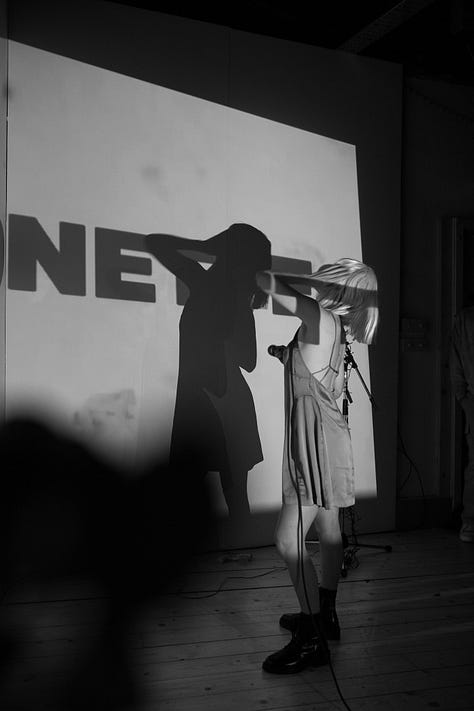
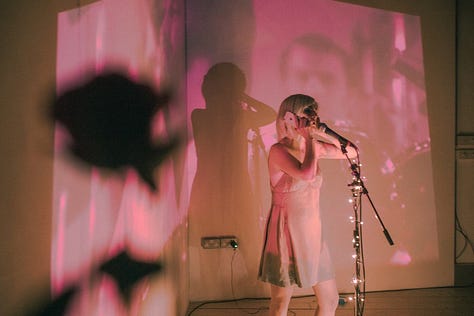
We end on The White Stripes and a remix of their live version of “Jolene”20 taken from the DVD Under Blackpool Lights, dir. by Dick Carruthers. I find this version electric. Even Dolly purportedly says it’s the best.


But what makes a best version? Is it its ‘feel’?
The notion of a ‘feel’ as being the word most commonly called upon by listeners when recalling popular music has been theorised by the musicologist Professor Allan F. Moore, both in Song Means: Analysing and interpreting recorded and popular song (2012)21 and through his more hermeneutic analyses on texture.22 Or is it more something along the lines of the quote below, extracted from the comments section on YouTube, by user @OvelNick, in that, “Dolly sings it like she's trying to prevent her from taking him. Jack sings it like it's happened and the pain has settled in his soul.”23
Returning to holes, Hilton’s LA Gun Club24 is currently exhibiting at the Palo Gallery, NYC (9 February - 6 April, 2024). The final exhibits, documented on her website25, are photographs of used targets shot at on the range which she then flew back to London with her; an ideological apparatus which can work to demystify the gun legacy enforced by the second amendment in the U.S. Each photograph is accompanied by a brief commentary - or intention - from those who get to choose their target.
Han, B. 2017. Psychopolitics. Neoliberalism and new technologies of power. Translated by E. Butler. London: Verso.
Illouz, E. 2007. Cold intimacies: The making of emotional capitalism. Cambridge: Polity Press.
Liu, C. 2021. Virtue hoarders: The case against the professional managerial class. Minneapolis: University of Minnesota Press. [Online]. [Accessed 1 September 2024]. Available from: https://muse.jhu.edu/book/82543
Han, B. 2015. The burnout society. Translated by E. Butler. CA: Stanford University Press.
Talbot, S.L. 2023f. Stars (disappearing messages). Sam Lou Talbot. Space junk. [Online]. Glasgow: Sam Lou Talbot. [Accessed 29 September 2023]. Available from: https://samloutalbot.bandcamp.com/track/stars-disappearing-messages
Samman, A. and Gammon, E. eds. 2024. Clickbait capitalism. Economies of desire in the 21st century. [Online]. [Accessed 10 October 2024]. Available from: https://doi.org/10.7765/9781526168177
Pmilat. 2014. Mark Fisher: The slow cancellation of the future. [Online]. Accessed 19 December 2016]. Available from: http://www.youtube.com/watch?v=aCgkLICTskQ
Fisher, M. 2022. Postcapitalist desire. The final lectures of Mark Fisher. London: Repeater Books.
D’Souza, S. 2024. Pitchfork. The collective, Kim Gordon. Pitchfork. [Online]. 8 March. [Accessed 10 March 2024]. Available from: https://pitchfork.com/reviews/albums/kim-gordon-the-collective
Kim Gordan. 2024. The collective. New York: Matador Records. [Online]. [Accessed 8 March]. Available from: https://kimgordon.bandcamp.com/album/the-collective
Gordan, K. 2020. Music on the internet has no context. In: Gleeson, S. and Gordon, K. eds. This woman’s work. Essays on music. London: White Rabbit, p.70-79.
Hilton, J. 2013. Precious. Amsterdam: Schilt Publishing.
Farrant, T. 2024. Cowboys, drag queens and circus folk: Jane Hilton on photographing the misfits of America. Euronews.culture. [Online]. 7 March. [Accessed 11 March 2024]. Available at: https://www.euronews.com/culture/2024/03/07/cowboys-drag-queens-and-circus-folk-jane-hilton-on-photographing-the-misfits-of-america#:~:text=Jane%20Hilton%3A%20Mainly%20the%20light,expanse%20of%20desert%20and%20sky
Han, B. 2018. Saving beauty. Translated by D. Steuer. Cambridge: Polity Press.
Han rallies here against our consumption of images and the pornification of beauty which is flattened online in an aesthetic dimension spurred by ‘likes’ and heart emojis. In opposition, what appeals in the quirks and imperfections witnessed in the body types featured in Hilton’s “Precious” (2013) or “Drag Queen Cowboys” (Hilton, 2024), for example, is that which is unsettling, queer, incongruous, and anticipatory, qualities which cannot be easily summed up in an emoji.
We can see the extension of emotional capitalism in the job market, for example, LinkedIn adverts may routinely feature emojis. Even my energy company, either train, or have no issue with new starters littering their emails with heart emojis, and child like language, in response to a query on billing, as I have received several replies in this tone from new starters at the company. Moreover, when they couch the passing on of yet another increase in standing charge to their regular customers, as opposed to those on business rates, the CEO, Pete, always signs off with “Love and Power”. What do they expect me to feel? Loyalty?
Samman, A. and Gammon, E. eds. 2023. Clickbait capitalism: Economies of desire in the twenty-first century. [Online]. Manchester: Manchester Scholarship Online. [Accessed 15 October 2024]. Available from: https://doi.org/10.7765/9781526168177
Badiou, A. and Truong, N. 2012. In praise of love. Translated by P. Bush. London: Serpent’s Tail.
Žižek, S. 2014. Event. A philosophical journey through a concept. London: Melville House.
Žižek, S. 2014. Event. A philosophical journey through a concept. London: Melville House.
Talbot, S.L. 2023h. Freezer Delight. Sam Lou Talbot. Space junk. [Online]. Glasgow: Sam Lou Talbot. [Accessed 25 October 2024]. Available from: https://samloutalbot.bandcamp.com/track/freezer-delight
Sam Lou Talbot. 2023a. Saloon. [Online]. [Accessed 26 May 2023]. Available from: https://vimeo.com/830581971?msockid=37dc71812b676dbc083665bc2af06c6f
White Stripes. 2009. The White Stripes - Jolene (Official Music video. [Online]. [Accessed 11 March 2024]. Available from: http://www.youtube.com/watch?v=yXlULkwhgrc
Moore, A. 2012. Song Means: Analysing and interpreting recorded and popular song. Farnham, Surrey: Ashgate.
Society for Musical Analysis. 2016. Aspects of Popular Music. Allan Moore. [Online]. [Accessed 11 March 2024]. Available from: https://youtube.com/watch?v=X_DPeZv8OvA
NickOvel. 2016. Comment on: The White Stripes. 2009. The White Stripes - Jolene (Official Music video. [Online]. Comment posted 2022. [Accessed 11 March 2024]. Available from: http://www.youtube.com/watch?v=yXlULkwhgrc
Hilton, J. 2016. LA gun club. Palo Gallery, 30 Bond Street, New York City, NY, 10012.
Hilton, J. 2024. Jane Hilton’s personal website. [Online]. [Accessed 12 March 2024]. Available from: https://janehilton.com


